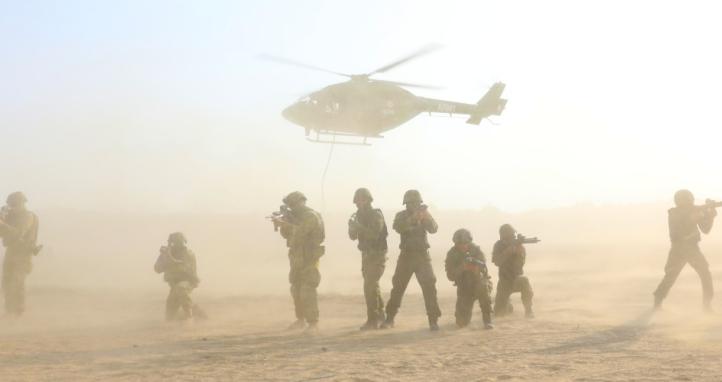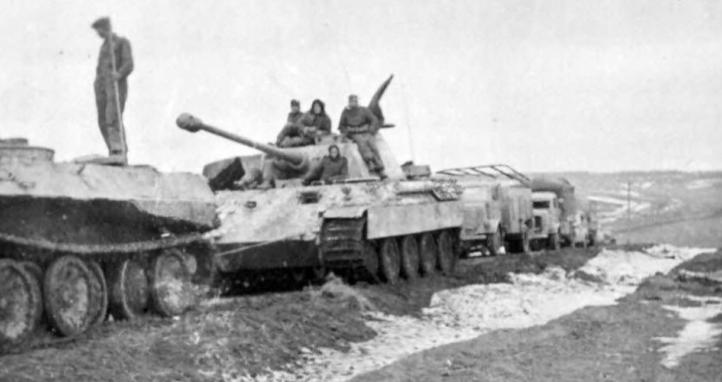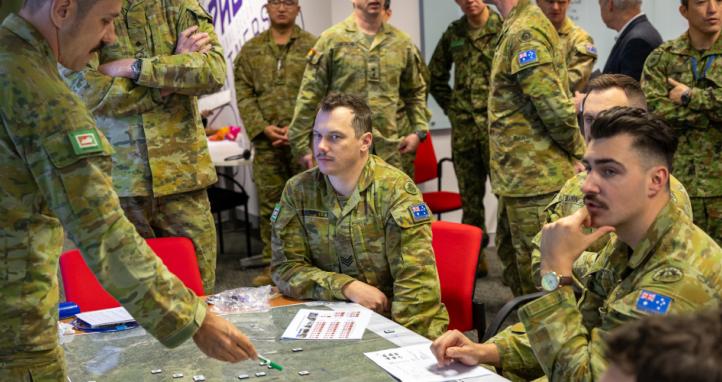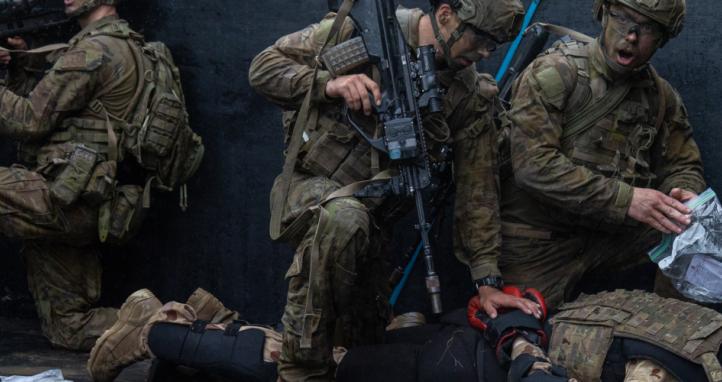Defining the enduring nature of war is critical for effective strategy and policy, yet it remains an elusive task due to its complex and multifaceted character. As warfare adapts to new technologies and shifting geopolitical realities, the fundamental human motivations behind conflict – fear, power, and ideology – persist, complicating our efforts to pin down a singular definition. This challenge isn’t just a philosophical debate, but a key concept for strategy.
In a keynote address at the Chief of Army Symposium, Lieutenant General Simon Stuart, AO, DSC sought to take this challenge head on for the Australian Army, with a focus on fighting in the littoral and delivering long-range fires.
The Chief reflected, “As a professional soldier and a student of history, I spend much of my time focused on the tension between war’s enduring nature and its ever changing character,” suggesting the audience reflect on a recent article by Stephen Biddle. Listening to Lieutenant General Stuart, I found I could not list the tenets of war’s enduring nature.
As a 21-year veteran myself, with multiple deployments to Iraq, Afghanistan, as well as throughout the First Island Chain, the ‘principles of war’ come to mind quickly. But what was war’s ‘immutable nature’? I found little solace when I later dropped the query into a chat with my peers and they were equally bemused.
Biddle’s article gave no suggestion, so I spent the next week reviewing literature. I found the concept traced back to Carl and Marie von Clausewitz’s seminal work, On War. The problem though, beyond translation errors to an unfinished work, is that Carl and Marie never precisely defined war’s nature either.
However, their definition of war itself is close to the Chief’s “… brutal, uncontrollable contest of wills, fought by humans for political ends and with devastating effect.” Brutal. Wills. Political Ends. Is all else character?
The Chief used ‘brutal’ and ‘devastating effect’, which no one who has seen the unforgettable horrors of combat and smelled the acrid burn of cordite would dispute. The Clausewitzian definition centred on ‘…an act of violence…’, but must war be violent? What about irregular war – or ‘the grey zone’ approach to competition favoured by our adversaries, which seeks to ‘win without fighting’. Is the threat of violence enough?
Is the western insistence on violence part of why we have struggled to understand and contest this space? Indeed, in his just over 30-minute address, the Chief referenced 16 authors about war, but none were outside the Western tradition.[1] What of Sun Tzu? Che Guevara or Mao Zedong? With the proliferation of irregular wars, should we be reminded armies do not get to choose the sorts of wars we fight?
At first glance, policy seems an obvious inclusion in war’s nature. After all, a “…brutal, uncontrollable contest of wills, fought by humans with devastating effect” could easily describe a game of footy. Policy is the key difference. Except we spent 20 years fighting in Afghanistan without a clear policy. Were we, as military leaders, too focused on the violence part of war’s nature to miss its ultimate mistress?
It’s clear from the Afghanistan experience that you can have a ‘war’ without a policy, or at least a political decision, but you can’t win it. What is a war without policy? As we reflect on what the Chief called the ’Long Shadow of Afghanistan’, maybe we will find answers.
Many a pundit has proposed future war will be fought by machines, not humans. Here I agree with Biddle, who doesn’t foresee a future war without humans. Neither does Dr. Jack Watling, the Chief’s guest speaker at his symposium. Watling’s research in Ukraine has shown the increase in robots saw no decrease in the need for humans. Instead, future war looks to be fought with growing numbers of centaurs of human machine teaming.
How do robots and AI impact ‘will’? At first glance, they don’t appear to impact it much at all. In 2019, when Iran shot down an unmanned US Global Hawk, both sides rattled sabres, but nothing much came from it. Had a human pilot been killed, it was easy to see how the already volatile situation would have escalated. Public will would have boiled. But with a robot – cooler heads prevailed.
Indeed, can AI even be given ‘will’? What does it mean when “…an agent capable of making independent judgments and decisions” doesn’t weigh self-preservation of itself or even its country? Human level AI may still be years away, but we are incorporating drones and machine learning tools into combat today.
While war’s nature is supposedly immutable, its character is defined by change. The vaunted Revolution in Military Affairs may seem to be always over the next rise, but perhaps evolution and constant innovation should be included in its nature. While the focus often goes to the newest, biggest, most expensive technology, Biddle reminds us, ‘How combatants use their technology and adapt to their enemy’s equipment is at least as important and often more so.’
Here, Dr. Watling’s presentation at the symposium was particularly informative. He cited how the English longbow was superior in killing power to the musket until well into the 17th century. But the years it took to train a longbowman couldn’t keep pace with the months it took to train a flintlock infantryman. Watling illustrated how snipers, a prestige skillset in our formations, may be modern day longbowmen. A Ukrainian drone operator can kill more accurately at four times the distances, all with half the training time.
But war has always been thus. Romantic historians love to lionize the prowess of the extensively trained Spartan Army. They will even joyfully recount how when Phillip II of Macedon threatened Sparta with ‘If I invade Lakonia you will be destroyed, never to rise again’, the Spartans laconic reply was just one word: ‘If’. They tend to leave off how doubling the length of the Greek spear enabled Phillip II to conquer the Peloponnese with farmers. War’s nature is not always one of greater lethality from higher technology. Often the advantage goes to the side that can simplify destruction at greater scale.
The Red Queen effect is as integral to war today as it was in the ancient world, be that the Peloponnesian War or the Warring States period. Here, Lieutenant General Stuart is right that ‘…we should approach this topic with a great deal of humility, and respect for war’s unpredictable nature’. His call to examine war’s nature, its character, and its costs, is well timed. I certainly benefited from his charge to examine our profession’s first principles.
End Notes
[1] Fukuyama, Carl & Marie Clausewitz, Thucydides, Foch, Monash, Biddle, Watling, Hobbes, Tuchman, Homer, Huntington, Hackett, Howard, Keegan, Jomini. Clearly the Chief’s call to study “… the classical theories and practise of warfare…” is something he believes in.










https://cove.army.gov.au/article/chief-army-symposium-2024-human-face-battle